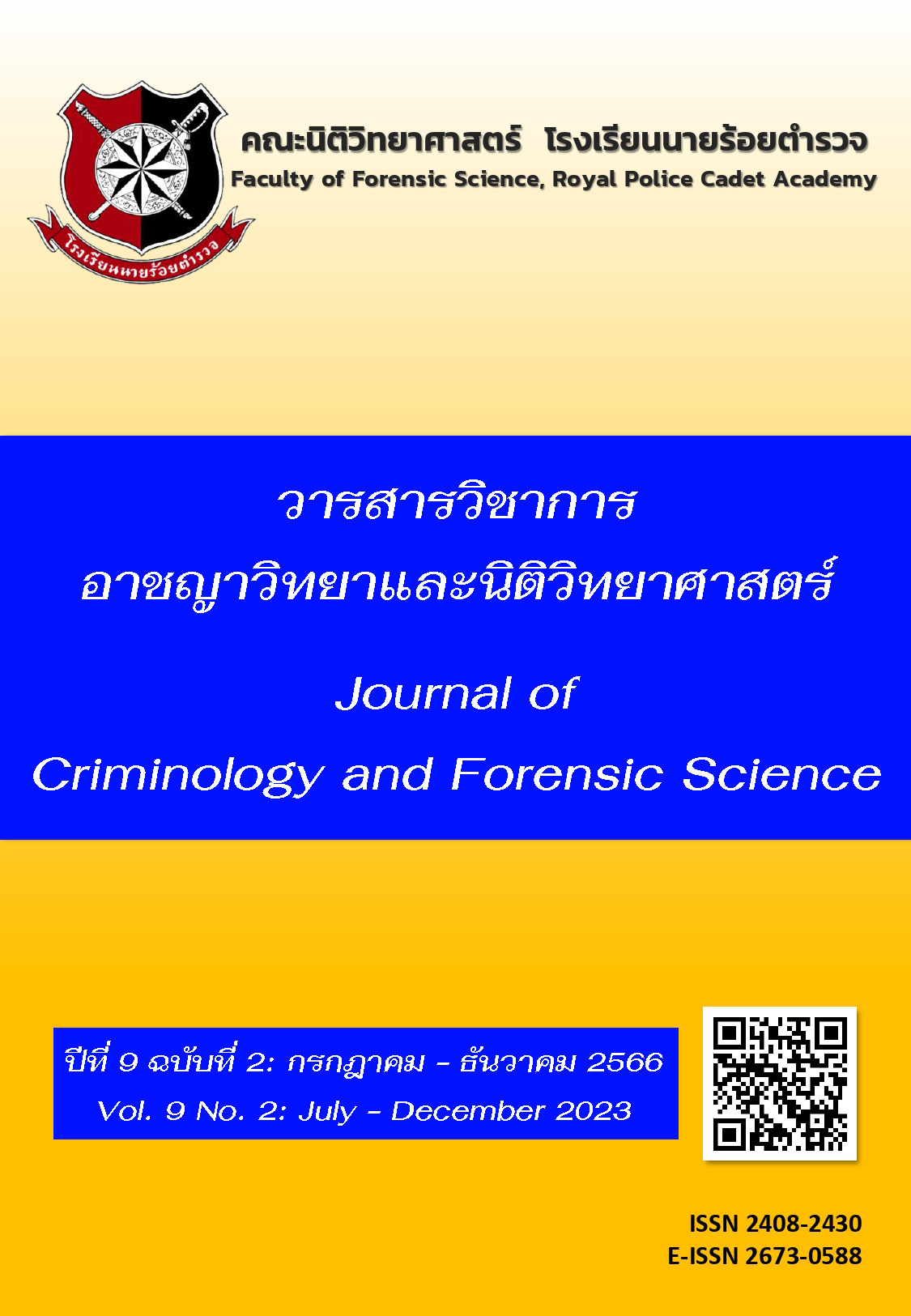กระบวนการเข้าถึงพยานหลักฐานทางดิจิทัลสำหรับเจ้าหน้าที่สืบสวนเชิงคดี
Main Article Content
บทคัดย่อ
บทความนี้ศึกษาถึงแนวทางการแก้ไขปัญหาการเข้าถึงพยานหลักฐานทางดิจิทัลและอำนาจหน้าที่ของเจ้าหน้าที่ในการปฏิบัติงาน ซึ่งประกอบด้วย (1) ความหมายของข้อมูลอิเล็กทรอนิกส์ (2) การเข้าถึงข้อมูลหลักฐานทางอิเล็กทรอนิกส์ (3) หลักการให้ความยินยอมตามกฎหมาย ซึ่งการเข้าถึงข้อมูลหลักฐานทางดิจิทัลสำหรับเจ้าหน้าที่ผู้ปฏิบัติงานทางนิติวิทยาศาสตร์ในประเทศไทยมีปัจจัยและข้อจำกัดทางกฎหมายหลายด้าน การศึกษานี้จึงมีวัตถุประสงค์เพื่อศึกษาแนวทางการป้องกันในปัญหาและอุปสรรค
ของการเข้าถึงพยานหลักฐานทางอิเล็กทรอนิกส์ เพื่อจะได้เป็นแนวทางในการนำมาแก้ไขปรับปรุง
ข้อกฎหมายในการปฏิบัติงานของเจ้าหน้าที่ให้มีความเหมาะสม สอดคล้องกับตำแหน่งหน้าที่ ทั้งนี้
ผู้ให้ข้อมูลหลักได้ให้สัมภาษณ์ทั้งหมด คือ เจ้าหน้าที่จากหน่วยงานทางนิติวิทยาศาสตร์ที่เกี่ยวข้องกับ
การบังคับใช้กฎหมายในประเทศไทย จำนวน 3 หน่วยงาน หน่วยงานละ 4 ราย ได้แก่ กรมสอบสวนคดีพิศษ สำนักงานพิสูจน์หลักฐานตำรวจ สำนักงานตำรวจแห่งชาติ และกองบังคับการปราบปรามการ
กระทำความผิดเกี่ยวกับอาชญากรรมทางเทคโนโลยี (บก.ปอท.) ที่เป็นผู้มีความรู้ความสามารถและมีประสบการณ์การทำงานในด้านพิสูจน์หลักฐานทางอิเล็กทรอนิกส์ไม่ต่ำกว่า 3 - 5 ปี โดยส่วนใหญ่
ให้ความสำคัญกับปัญหาทางด้านข้อกฎหมาย เทคโนโลยี งบประมาณและบุคลากร ทั้งนี้ยังมีข้อเสนอแนะในการปรับแก้ข้อกฎหมาย จัดสรรงบประมาณ จัดการฝึกอบรมให้กับเจ้าหน้าที่ทุกระดับ
Article Details

อนุญาตภายใต้เงื่อนไข Creative Commons Attribution-NonCommercial-NoDerivatives 4.0 International License.
เนื้อหาและข้อมูลในบทความที่ลงตีพิมพ์ใน วารสารวิชาการอาชญาวิทยาและนิติวิทยาศาสตร์ โรงเรียนนายร้อยตำรวจ ถิอว่าเป็นข้อคิดเห็นและความรั้บผิดชอบของผู้เขียนบทความโดยตรงซึ่งกองบรรณาธิการวารสาร ไม่จำเป็นต้องเห็นด้วยหรือรับผิดชอบใดๆ
บทความ ข้อมูล เนื้อหา รูปภาพ ฯลฯ ที่ได้รับการตีพิมพ์ใน วารสารวิชาการอาชญาวิทยาและนิติวิทยาศาสตร์ ถือว่าเป็นลิขสิทธิ์ของวารสาร วารสารวิชาการอาชญาวิทยาและนิติวิทยาศาสตร์ หากบุคคลหรือหน่วยงานใดต้องการนำทั้งหมดหรือส่วนหนึ่งส่วนใดไปเผยแพร่ต่อหรือเพื่อกระทำการใดๆ จะต้องได้รับอนุญาตเป็นลายลักษณ์อักษรจาก วารสารวิชาการอาชญาวิทยาและนิติวิทยาศาสตร์ ก่อนเท่านั้น
เอกสารอ้างอิง
Kallachai Rattanasakawong. (1980). Studies in criminal law. Master of Laws Thesis, Thammasat University.
Natthanan Jaisue. (2021). Legal measures regarding listening to digital evidence. Sripatum University Chonburi Campus
Triphol Ketsuriya. (2015). Consent of minors in criminal law: a study of specific cases of body tattooing and genital mutilation. Master of Laws Thesis, Dhurakij Pundit University.
Nath Thanesavanich. (2012). Listening and methods for taking electronic evidence in criminal cases: Study according to the Computer Crimes Act of 2007. Master of Laws thesis. Criminal Law Department, Thammasat University.
Nanthawadee Kanchan. (2019). Problems in suppressing cybercrime under international law. Master's Thesis Department of Criminal Law Faculty of Law Thammasat University.
Criminal Procedure Code. (2008, 30 January). Royal Gazette. Volume 125 (Issue 28). Page 4
Pannat Khankhet. (2016). Legal problems regarding the collection of electronic evidence in the investigation court. Master of Laws Thesis, National Institute of Development Administration.
Computer Crime Act (No. 2) B.E. 2017. (2017, 24 January). Royal Gazette. Volume 134, Chapter 10, Pages 24-35.
Pichaisak Haryangkun, Narisara Daengpai. Principle of consent. https://www.stou.ac.th/Schools/Slw/upload/Ex%2040701-3.pdf
Wichayada Amphonkitwiwat. (2018). Computer Act: Computer Law or Security Protection Law. At the 1st National Jurisprudence Conference, topic: Thai Legal System: Reform/Transition/Restoration, 8 June 2018. Chiang Mai University, Chiang Mai.
Wiramon Daoduang. (2021). Problems in gathering evidence to prosecute cyber crimes. Master's Thesis Criminal Law Department, Thammasat University.
Wallika Oonsri. (2001). Problems in collecting and verifying electronic evidence in criminal cases. Master of Laws Thesis, Thammasat University.
Yadfon Chusaeng. (2016). Principles for listening to evidence that was created or obtained illegally: A comparative study of the status of evidence obtained by private individuals and In the case of acquisition by a government official. 39 – 40
Digital Forensics Center Electronic Transactions Development Agency (Public Organization) Working group to draft standards for digital evidence verification practices. (2016). Suggestions for standards for managing digital devices in evidence verification work.


